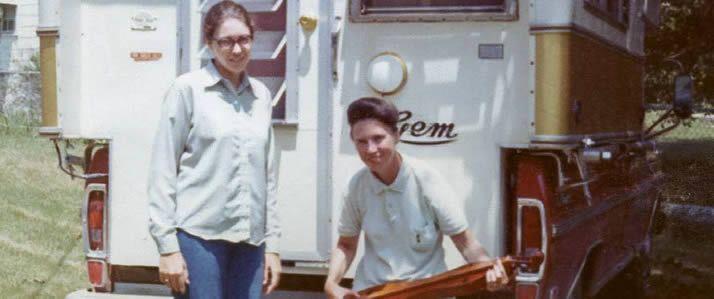An adventure in American English

The University of Wisconsin in Madison was as far as Sharon Huizenga ’67 had ever been from Byron Center, Mich. She arrived at the school’s graduate English department in the fall of 1967 bearing a letter of introduction from Calvin English professor Stanley Wiersma to Professor Fred Cassidy, who within the year would send her out on what Huizenga called, “my grand adventure.”
“I desperately wanted to wander and see things for myself,” she said. “The DARE project gave me the opportunity to run away—and get paid for it.”
The DARE project is the Dictionary of American Regional English. Launched by Cassidy, the project sent 80 fieldworkers to 1,002 communities in all 50 states between 1965 and 1970. Armed with a 1,600-item questionnaire and a reel-to-reel tape recorder, they gathered words, phrases and pronunciations particular to every region of the United States.
The painstaking process of editing the questionnaires, tapes and additional written sources into a five-volume dictionary of over 60,000 American regionalisms has taken almost 50 years. Volume five, with the final entry “zydeco,” was published in March.
When she set out in her brown Ford pickup and camper, Huizenga realized she would contribute to a lexicographical classic—but she was in it for the adventure.
First stop: southwest Virginia. It was the summer of 1968.
“This was the time of the freedom riders and voter registration drives,” Huizenga explained. “People in the South were suspicious of college students from up north. I wore a dress and did my hair conservatively. And, as a shy person, I didn’t have that in-your-face attitude.
“I had to find willing informants who were representative of their community and who had the stamina to answer a lot of questions from a stranger. We started with safe topics: What do you call a day that’s very hot? Then we moved on to dicier subjects: A mean person? To that I heard, ‘Mean enough to steal the pennies off a dead man’s eyes.’”
It might take a week to complete one questionnaire. By that time Huizenga often found herself staying with her informants. On Purgatory Mountain, Va., she lived with a family in a cabin without running water or electricity, where entertainment was playing old-timey music on the porch. She ate squirrel gravy and biscuits for breakfast and drank “sugarhead,” the local moonshine.
The editors of the DARE project were so pleased with her work that the following summer they sent her to Kentucky.
“It was a far more difficult area,” Huizenga said. “There are three distinct socioeconomic regions, each with subdivisions and dialectical variations. Good informants were hard to find, and they were busy.”
So she helped string and snap green beans or hang tobacco leaves in exchange for interview time. Though she encountered more suspicion in Kentucky, she also found, as she had in Virginia, “gracious people willing to share whatever they had.”
Huizenga finished her fieldwork in March 1970 back in Virginia, this time in the tidewater and island communities.
By the time her grand adventure was over, Huizenga had not only documented unique strains of spoken American English, she had discovered something more personal as well.
“I learned to interact with and respect a wide variety of people very different from me, and I gained some insight into my own personal journey. As a chaplain, I’m still using what I learned on that adventure.”






